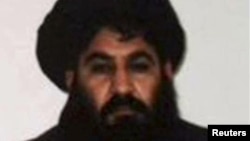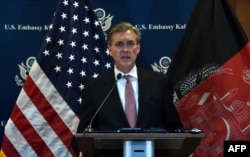The United States continues to monitor “conflicting reports” about the fate of Taliban leader, Mullah Akhtar Mansour, but is skeptical a clear picture will emerge soon. The U.S. Special Representative for Afghanistan and Pakistan made the remarks Sunday in Kabul.
After days of widespread reports that Taliban leader Mullah Akhtar Mansour had been seriously wounded in a gunfight with rival militant commanders, the Islamist insurgency released a voice message from its chief to prove he is alive.
Speaking in Kabul, U.S. Special envoy for Afghanistan and Pakistan Richard Olson said he was not in a position to comment on the authenticity of the recorded message.
“We have seen conflicting reports about what may have happened [to Mullah Mansour] and we are going to continue to monitor the situation. We are actually somewhat skeptical that we will have a great deal of clarity in the near term,” he said.
Seeking a negotiated peaceful settlement
In the message released Saturday, Mansour rejected reports of his death in a shootout in neighboring Pakistan and of rifts within the Taliban as propaganda from the Afghan government and its intelligence agency.
Olson reiterated Washington’s call for seeking a negotiated peaceful settlement to the Afghan conflict.
“We believe that stability in Afghanistan and the region requires an end to violence," said Olson. We believe that an Afghan-led and Afghan-owned peace process is the surest way to ensure lasting stability in Afghanistan.”
Afghan government and Taliban officials held a single round of groundbreaking peace talks in early July. But the process was quickly suspended after it was revealed that longtime Taliban leader Mullah Omar had died two years ago.
Omar's deputy, Mansour, was swiftly made the new chief of the insurgency, but he has faced opposition from a group of key Taliban commanders who formed a splinter faction. There have also been reports of deadly clashes between the two groups in recent weeks, though the mainstream Taliban has downplayed internal rifts as routine disagreements.
While Afghan security forces may militarily benefit from internal rivalries in the Taliban, critics fear it will pose greater challenges for internationally-backed peace efforts.





